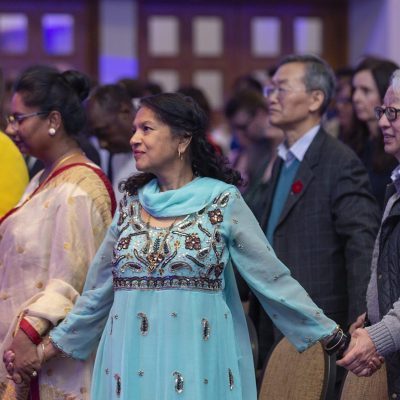Unity, Christian unity and, indeed, unity in general, can be one of the world’s most beautiful things. It can also be one of the most neglected.
In the church calendar, it may be that we take part in the annual Week of Prayer for Christian Unity or occasionally swap pulpits. In my experience, it is often left unexplored. We know that it is one of the things that Jesus prayed for on the night before He died. Our Lord prayed that we might be one.
As Christians we re-enact the breaking of bread and the sharing of wine, whilst sometimes ignore God’s heart to unify us through it. This is not to say that Christians do not come together from across chapels and churches. Before the current pandemic, a coffee morning was held in St Eleth in Amlwch. People from church and chapel gathered together putting the world to rights over a panad.
Now we are quickly finding new ways of being together whilst keeping apart. For example, as someone who was a relative technophobe, I am now becoming adept at meeting by Skype, Zoom and Messenger, whilst still using pen and ink to communicate. Indeed, at this time, there are wonderful examples of acts of kindness, generosity and compassion that demonstrate the underlying unity that humans feel one for the other.
Sadly, the reverse is true as well. As Christians we sometimes lose sight of unity because we focus too easily on what divides us, whether it be over our style of worship or who we allow to lead. Disunity can creep in over the slightest things. Individual congregations can divide over things seemingly as trivial as the flower rota, and indeed disunity lasts for far longer than the memory of the event that might have begun it all. We become good at using hermeneutical gymnastics to justify our position.
Nevertheless, we cannot avoid the fact that our Lord Jesus prayed that we might be one. Some of the best things that Christians have done have been done together. When I started life as a curate in Gloucester, we ran a youth project with other churches. Anglican, Baptist and Catholic Christians who had hardly ever met worked alongside one another. This working together transformed an entire estate. This should not surprise us, for it is woven into the overarching biblical narrative that God’s people should be one. As evidenced in the promise that Abraham would be a blessing to all people and the revolution of the early church that embraced both Gentile and Jew as sisters and brothers.
As we approach Easter, we will be confronted again by the prayer of Jesus in John 17:21 – 23 and the need to choose whether to be the answer to His prayers. In a world that currently seems to be so fragile and broken, we will remember that Jesus served His friends using a bowl and a towel. It may be that that our calling as Christians is to serve people once again through our actions and in our prayers. This we will do better if we do it together.
Coronafeirws: Bod gyda’n gilydd, ar wahân.
Sut allen ni annog Undod Cristnogol tra’n bod ni ar wahân?
Yng nghalendr yr eglwys, mae’n bosib ein bod yn cymryd rhan yn flynyddol yn yr Wythnos Weddi dros Undod Cristnogol neu’n cyfnewid pulpudau o bryd i’w gilydd. Yn fy mhrofiad i, mae’n drywydd sy’n aml yn cael ei adael heb ei ddilyn. Rydyn ni’n ymwybodol mai dyma un o’r pethau y bu Iesu’n gweddïo amdano ar y noson cyn ei farw. Gweddi ein Harglwydd oedd y basen ni yn un.
Fel Cristnogion fe fyddwn yn ail-greu gweithred symbolaidd torri’r bara a rhannu’r gwin, er ein bod weithiau’n anwybyddu dyhead calon Duw inni gael ein huno drwyddi. Nid deud ydw i nad ydy Cristnogion yn dod ynghyd ar draws y capeli a’r eglwysi. Cyn y pandemig presennol yma, cynhaliwyd bore coffi yn Sant Eleth yn Amlwch. Daeth pobl eglwys a chapel at ei gilydd i roi’r byd yn ei le dros banad.
Bellach, rydyn ni brysur canfod bob math o ffyrdd o gadw mewn cysylltiad er ein bod ar wahân. Er enghraifft, fel rhywun a oedd braidd yn amheus a di-glem am dechnoleg, dwi erbyn hyn yn dod yn dipyn o hen law ar drin Skype, Zoom a Messenger, tra’n parhau i ddefnyddio pen ag inc i gyfathrebu. Yn wir, mewn cyfnod fel hwn, gwelir esiamplau hyfryd o garedigrwydd, haelioni a thosturi, sy’n arddangos yr undod gwaelodol mae’r ddynoliaeth yn teimlo tuag at ei gilydd yn y bôn.
Y tristwch ydy bod y gwrthwyneb i hyn hefyd yn wir. Fel Cristnogion rydyn ni weithiau’n colli golwg o undod, gan ein bod mor hawdd inni ganolbwyntio ar yr hyn sy’n ein gwahanu, boed hynny’n anghytuno ar ddull addoli neu pwy sy’n cael arwain. Gall y pethau lleiaf beri diffyg undod. Gall cynulleidfaoedd unigol ymrannu dros fân bethau dibwys megis trefn y rota flodau ac, yn wir, i’r fath raddau fel bod y diffyg undod hwnnw’n gallu para’n hirach na’r cof am y digwyddiad a fu’n asgwrn y gynnen yn y lle cyntaf! Rydyn ni’n giamstars am wyrdroi a dehongli sefyllfa i gyfiawnhau ein safbwynt.
Fodd bynnag, fedrwn ni ddim osgoi’r ffaith y bu i’n Harglwydd Iesu weddïo inni fod yn un. Mae’r rhai o’r pethau gorau a gyflawnwyd gan Gristnogion wedi’u cyflawni ar y cyd. Pan ddechreuais i fy nghuradiaeth yng Nghaerloyw, roedden ni’n cynnal prosiect i’r ieuenctid gydag eglwysi eraill. Roedd Cristnogion o gefndiroedd Anglicanaidd, Bedyddwyr a Phabyddol — pobl a oedd prin wedi cyfarfod na gweithio ochr yn ochr â’i gilydd. Bu i’r cydweithio yma drawsnewid yr holl stad. Ddylai hynny ddim ein synnu, gan ei fod yng ngwead cyffredinol y naratif Beiblaidd y dylai pobl Dduw fod fel un. Ceir tystiolaeth o hynny yn yr addewid gafodd Abraham y byddai’n fendith i’r holl bobl ac yn chwyldro’r eglwys fore a gofleidiodd pawb, boed yn Iddew neu o’r cenhedloedd eraill, fel brodyr a chwiorydd.
Wrth inni agosáu at y Pasg, fe gawn glywed eto gweddi Iesu yn Ioan 17:21 – 23 a’r angen i ddewis p’un ai i fod yn ateb i’w weddïau. Mewn byd sy’n ymddangos mor fregus a thoredig ar hyn o bryd, cofiwn i Iesu wasanaethu ei gyfeillion gan ddefnyddio powlen a thywel. Efallai mai’r alwad i ni fel Cristnogion ydy i wasanaethu pobl unwaith eto trwy air, gweithred a gweddi. Fe lwyddwn i wneud hynny’n well wrth gyd-dynnu fel un.



